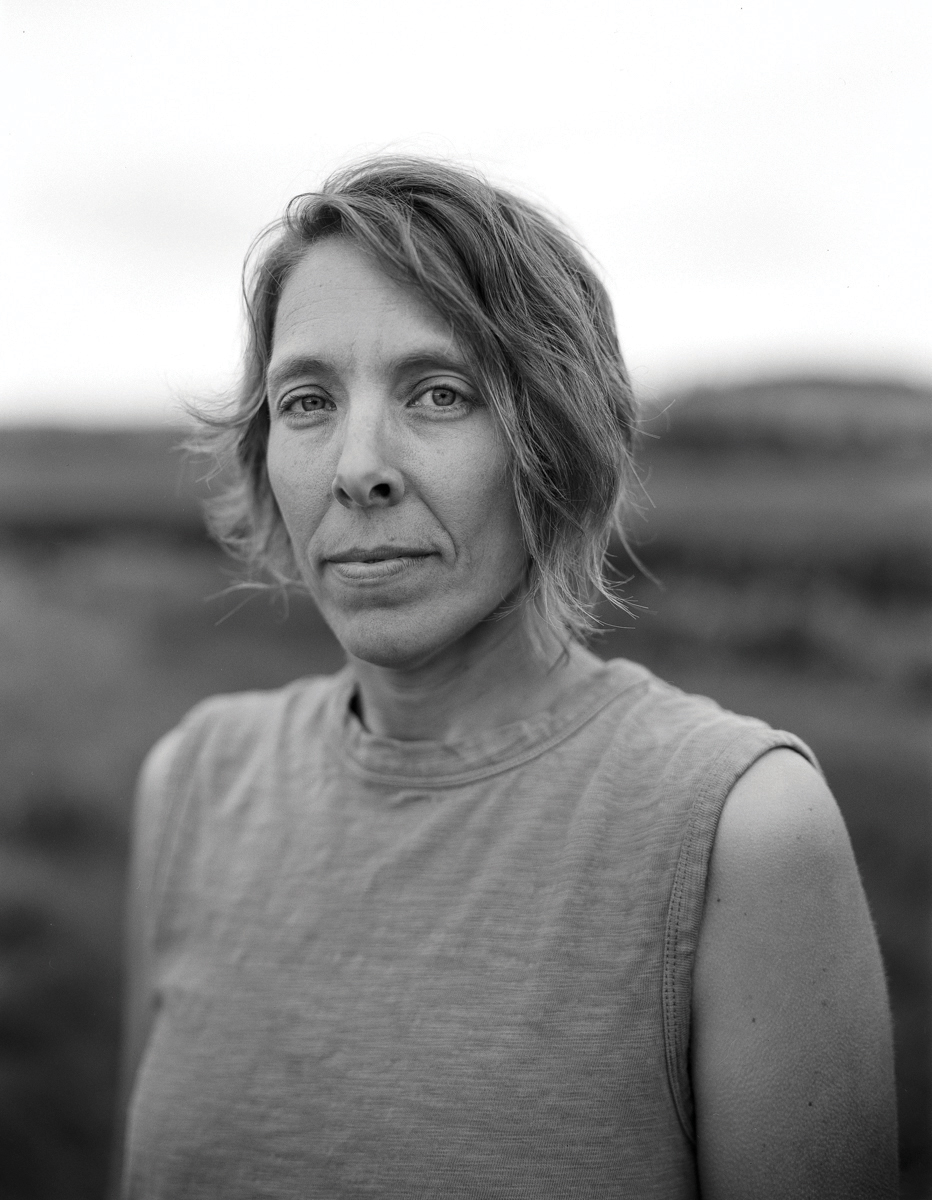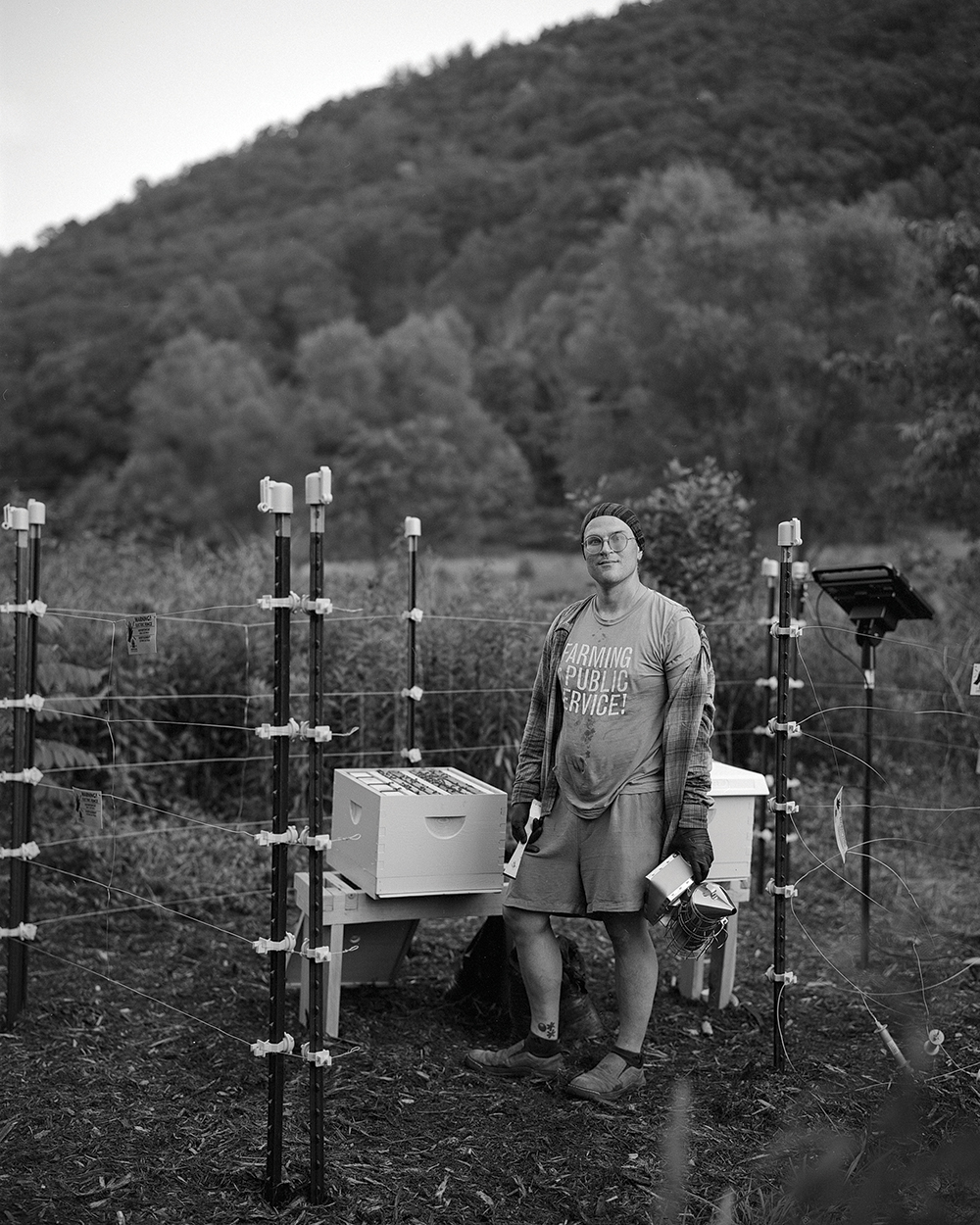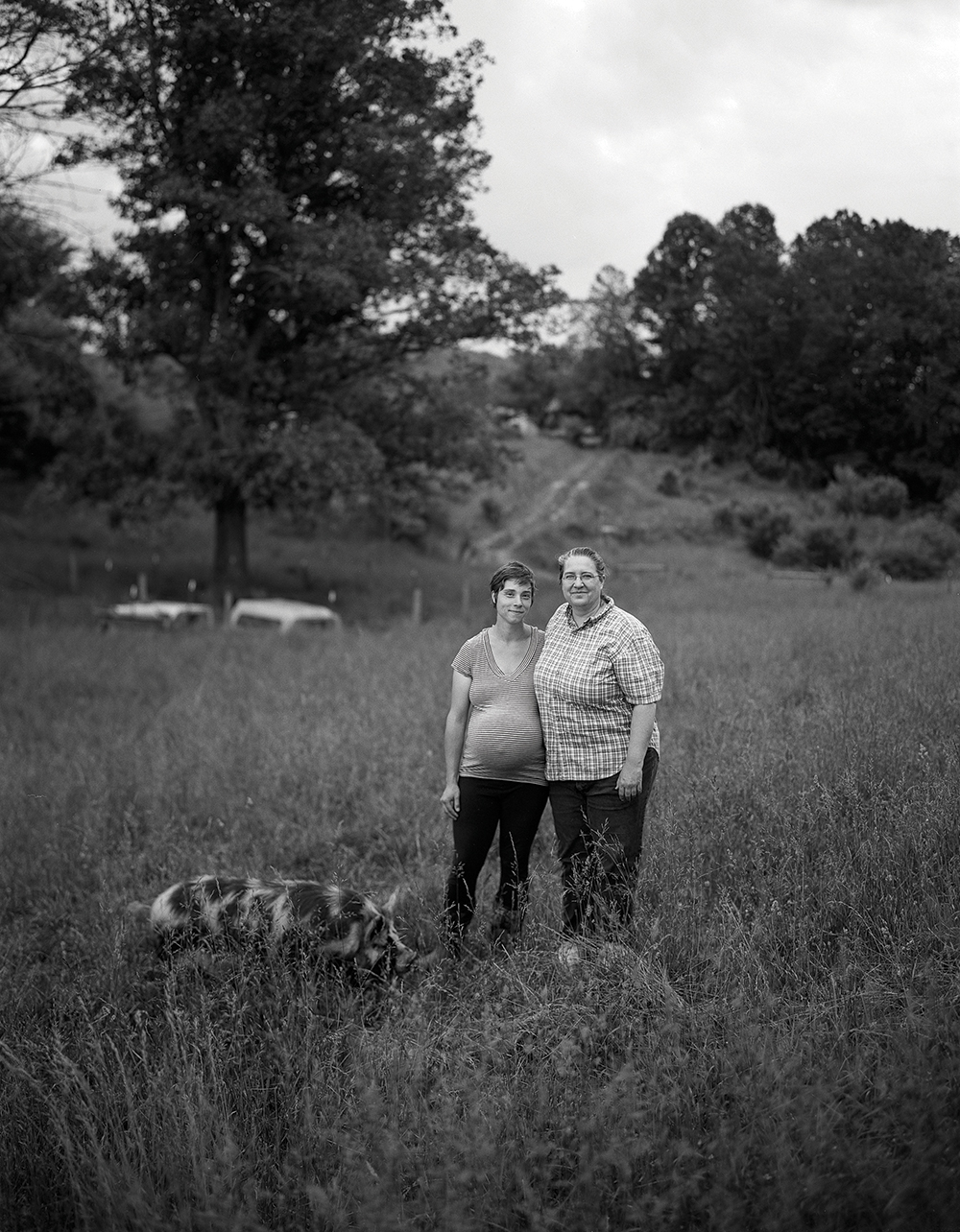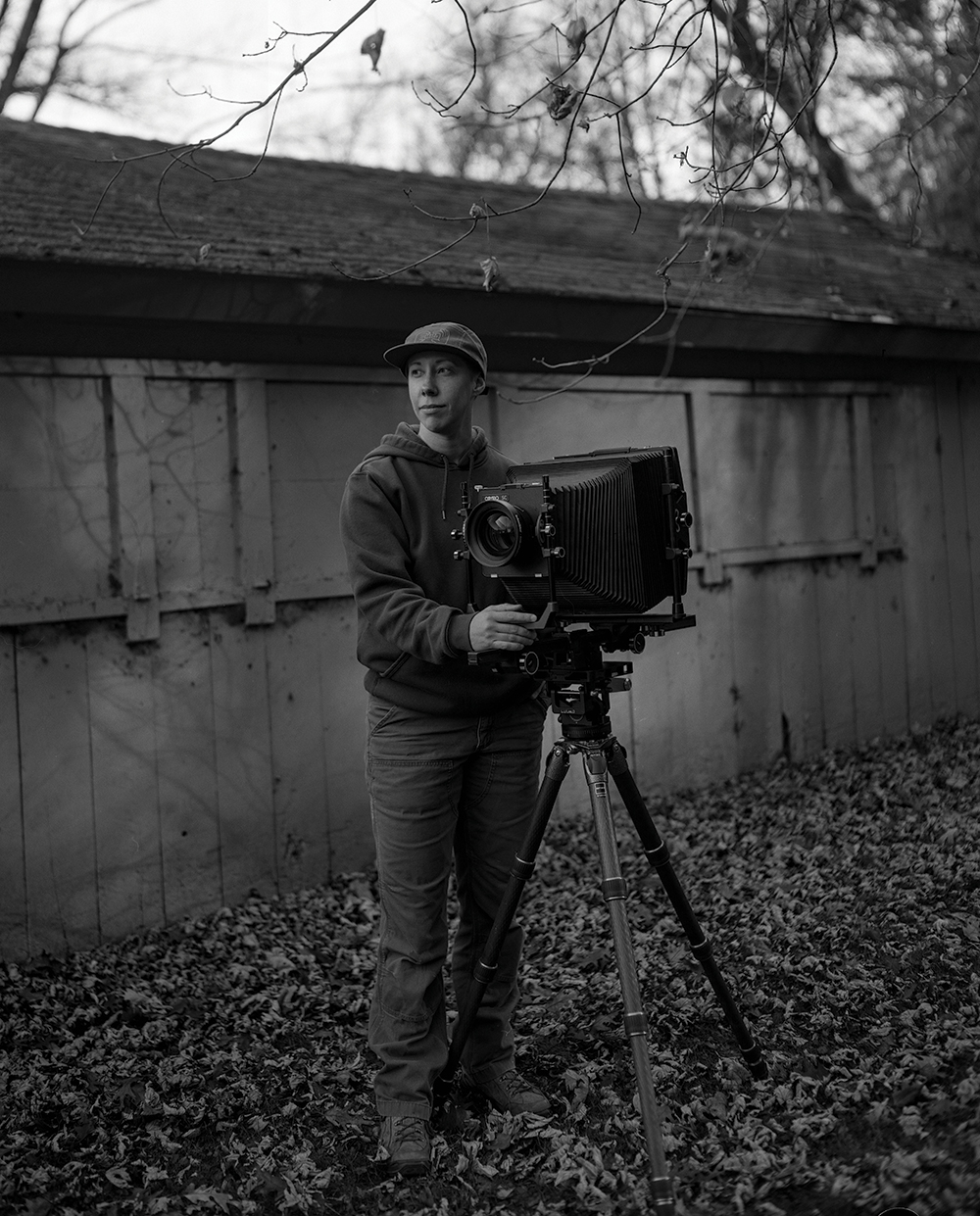Even though I came out in my early twenties, for a long time I didn’t feel confident enough in myself to show who I truly was and to express myself in a way that felt authentic. In my mid-twenties I decided to move out of my hometown of Madison to Chicago to try to explore myself more. I started rock climbing and found community there, and dabbled a bit in photography as well. I felt I had created enough space for myself to consider who I truly was and what I wanted out of life. Around that same time, I met my wife by chance when we randomly became roommates in a three-bedroom apartment in Chicago. It didn’t take long for me to develop feelings for her—she has the kind of personality that is bubbly, warm, and slightly awkward in the most adorable way. She was at the end of a messy long-term relationship, and had never dated a woman before. It took many agonizing months of me being head over heels in love for Daniela to realize there was more between us than just friendship. I often said to my friends that I feel like I could marry this woman (my poor friends and family had to hear the play-by-play of our every interaction for months!). Being with her feels like the ultimate stroke of good fortune, and I take every opportunity to shout from the rooftops how in love with her I am. I think that’s due, in part, to being an extremely sentimental person—I’m always thinking of the personal history and significance of any place, time, or thing. That sentiment carries through in everything I do photographically as well. My artistic practice explores the topics of identity and legacy through photography and portraiture, and I am currently in the midst of two bodies of work.
“Queering Rural Spaces” started as an internal exploration as I was contemplating the future of my family with my wife. We were deciding whether to return to living on a farm, or stay in the apparent “safety” of a larger city. In thinking about who was truly welcome in rural spaces, I wanted to learn from the queer people who called these places home. Has rurality supported and honored their identity? Do they feel safe and fulfilled? How do they find their own sense of community there? Society’s obvious love affair with small town life led me to speculate how gender and sexuality intersects with the love of rurality. For this project, I have traveled to different states to photograph and interview queer farmers. I wanted this underrecognized community to have the space to speak their own truth and show the nuances of their own experiences, and so each person’s interview is as important as their portrait. As I continue this exploration, I have been going back to revisit farmers in order to go beyond creating a representative portrait of them. Queering Rural Spaces is an ongoing project that continues to evolve and aims to reimagine the rural community’s past and present.
My second body of work “Redefining Conception” sheds light on the intimacy and intentionality of growing a queer family. This autobiographical series explores the often complex process of growing a family as a lesbian couple. We wanted to speak to the experiences involved in our journey—deciding on the conception method that best worked for us, hiring a lawyer to draft a sperm donation agreement, and tracking ovulation cycles in order to perform home inseminations. By intentionally occupying these moments in our lives, we are able to visually explore the complexity of emotions that come to the surface. Ultimately, I wanted these photographs to help our future child understand their origin story and how they came to be in this world.
My photographic practice is greatly influenced by using a view camera. A view camera is essentially a large box with a lens on one side and the film goes on the other side. It forces you to spend so much time crafting and composing each image. It feels almost as if time stands still and this contributes to a formal-yet-intimate feel in the images. It’s really important for me to continue the craft and care of each photograph, and so I enjoy creating each print by hand in the darkroom. There is a certain magic to the process of making silver gelatin prints by hand—watching the image come to life in the tray full of developer chemicals, and the feel of the soft fiber paper under your hands as you wash the print in water baths to remove any chemicals remaining in the fibers of the paper. I much prefer that experience to being on my computer editing in photoshop—instead it’s a tactile and physical skill to use your hands to lighten parts of the print by physically blocking the light from hitting the paper. Being in the darkroom is without a doubt my happy place.
Everything I do photographically and artistically stems from reading a book filled with images of the history of queer liberation as the authors described feeling “as if we’d discovered a family album full of people to whom we were deeply connected—infinitely indebted—and about whom we knew next to nothing.” This instilled a deep sense of the importance of recordkeeping and legacy-making within the communities around me. I don’t know where any of these projects or pursuits will lead me, but I do know that I’m having these brilliant, raw, and deep conversations with people in the queer community, and within my own family as well. I guess that’s all that any of us can hope for in our creative pursuits—to find meaning. The rest is icing on the cake.
Sam (he/him or they/them)
I identify lots of ways: Sam (he/him or they/them), queer, trans, sometimes agender, gender fluid, gender queer, Taiwanese-American, multiracial, settler, mostly middle-class, farmer, gardener. [Occupying space as a queer person and farmer] feels really stabilizing, and I also feel spiritually, emotionally, and physically connected to myself and everything around me. I feel actually more connected to life and death in this weird way. It’s like I’m seeing the whole cycle of it, and one thing feeds another. Everything returns to the land and everything comes from the land. On top of that, I feel like I’m always trying to find my role in the movement, in life, and I think making space for people, growing things, and providing things that support and nourish people is a role that I really feel connected to and feel good in.
Marjorie (They/Them) & Dustin (he/him)
Marjorie: My pronouns are they/them, I identify as queer. I think my gender is fluid and my sexuality is fluid. So I have identified differently at different times in my life. But I think that “queer” is the term that best fits my gender and my sexuality.
Dustin: My pronouns are he/him, and I identify as queer.
Marjorie: Well, we are hetero-passing. And so, that makes things a lot less dangerous for us. I’m not white, though. So, I always have to navigate that. And I’m not necessarily out to every person that I meet, either. It’s just not safe. And so, you know it’s just we’re always walking that line, but as a queer couple we have an immense amount of privilege because you know we’re cis-passing, hetero-passing, and homeowners. We have class privilege, and shit. The thing that I am missing here is community. I love social media, that’s why we use social media to meet real people and build community. I would like for this to be a retreat space for BIPOC and LGBTQ people to rest first and foremost. But also create, because we have a studio to do art stuff, to be able to connect with nature, learn about homesteading and farming because those aren’t really great friendly communities to hold space in and exist in. Eventually I would like to be able to pay black people to come here on residency and do whatever. Like art, or music. Honestly, just rest. Just to have access to good homegrown food, and a space to just turn off and rest.
Emi (she/her) & Hannah (she/her)
Emi: I really am out of love with my identity right now. Being this pregnant is really strange. I was trying to explain this to Hannah the other day—my identity has always been really odd—I look really cisgender female, and I am. It frustrates me a lot of the time because this is just the way I look. I want to be a guy with a shirt and pants on. I don’t look like this when I’m pregnant. It’s absolutely impossible. While I don’t identify as trans, I identify as on the spectrum of trans-ness. That’s why I just go with “queer.” I identify as female specifically because I like the transgressiveness of identifying as female and then looking like something else, which I cannot do when I am like this. And honestly I look so standardly female right now that it’s very disconcerting.
Hannah: I identify as a lesbian. I identify as gender non-conforming or slightly genderqueer, but in a boring way. You know?
Emi: I just have no fucking clue how I identify anymore. Which is why I’m like—I’m queer. I’m a queer woman. I don’t know what that means. I am a rural queer, which makes a huge difference to me. I do not belong in the city. It’s not for me. I had to grow up in that hell, and go to college in that hell, and I am never going back. I just literally cannot do it. One of the problems when we lived in Brooklyn was this constant threat of violence. Just for being queer—Hannah and I both would cross dress a lot of the time, and that was weird for people around us. You know, it’s just like constant slurs on the street and constant creepy people coming out of the shadows trying to act like they want to threaten you. It gets old. It gets to where you’re constantly tense on the streets trying to function.
Shoshana (she/her or they/them)
I identify as a queer trans woman. And I’m kinda still—probably always will be—working out my relationship with gender. I use both she and they pronouns, but these days I prefer she. I use the words “queer,” “sapphic,” “pansexual,” and “bisexual” to describe my sexuality pretty interchangeably depending on context. I’m also Jewish, of Ashkenazi descent, which is an important part of who I am. My identity exists in a lot of liminal spaces. I live in the border region of womanhood and also in the border region of whiteness.
Being in rural spaces, especially living and working on farms, gave me context and permission to embrace my queerness, both in sexuality and gender. Nature is very queer, and seeing that play out as often as you do on a farm—from crops that sprout intersex flowers to livestock displaying gender-defying behaviors and having gay sex—really helps every kind of identity feel natural and normal and precedented in all of existence.
Rural queer living has its unique challenges, but it’s also filled with wonderful blessings. It’s tough to cobble together my trans health care from medical tourism to Atlanta and the West Coast. And yet, when a hormone refill gets delayed in the mail, there’s a well-established underground local network of support to help me out in the interim. The queer community in rural spaces can be less visible to outsiders, but it feels especially tight and supportive. A friend once put it really well: “Rural queers have better conflict resolution skills than urban queers simply because we have to. We can’t afford to fracture our community because of a break-up, so we learn how to work things out and communicate better.”
Rufus (they/them)
It can be an interesting project to name my queer identity. There is dynamism involved—in my experience and knowledge of myself, and in the continual refinement and discovery of language. Transmasc genderqueer dyke daddy is how I would describe myself at this time. My pronouns are they/them. I am white, and my roots are Eastern European. I am an artist, dancer, and first-year flower farmer.
As rural queers, it is often not safe for us to be open about who we are. We keep our heads down and try to go about our days as best we can. When I first started seeking the queers out here, there were very few folx who were out and visible. Feeling profoundly isolated, I fled to the city whenever I could to have access to community. In recent years, the climate in our area has begun to shift. Not only are the queers becoming more visible, but more seem to be moving here because they feel welcome. What gives me the most hope are the vibrant, brave, and resilient queer youth who are springing up and working passionately for social justice, and who are fighting on behalf of those in the community who do not yet have the support and safety to be visible.
Cassie (she/her)
I lived a very straight life for a super-long time, and my story is mostly just that I wanted to be a mom. So I unknowingly ignored a lot of things in order to be a mom. Now my kids aren’t as tiny any more, and you start hearing other voices and learning things about yourself. It’s really interesting because I farm with my ex who is a cisgender male, and the vision for the farm is to try and do it together, but I don’t really know how queer I can build this space because we’re sharing it. And how that affects his heart essentially.
Me coming out was a surprise discovery that’s been really freeing for the both of us. So on the whole, it’s amicable. We’ve attracted a really queer workforce, so I’m able to be 100% who I am on my farm at all times. And so are the people that work here. So that’s really great. My ex in a way feels like “you get to do this cool thing where you’re part of this new community” and in his head he thinks it’s really easy. And I’m like, it’s kind of hard to come out when you’re 42. I think he sees how, even with the crew, he sees how tight-knit queer community is and how there’s just something different about queer spaces and queer community with the way that people feel comfortable and connect that’s very different than straight spaces.
Pamela (she/her)
My pronouns are she/her and “hard femme” resonates most with me. Moving to rural west Michigan from the SF Bay Area was a huge shift. Building community has been slower than I imagined. It’s been four years, and I feel like I am just figuring things out and finding my path here. Excited about having an arts, wellness + sustainability non-profit in the works. It has been eye opening to be around so many people who are not concerned with human rights and climate justice. Sometimes it’s difficult to stay open to having hard conversations with folks of opposing views. I feel this is some of the slow and steady work that is essential.
Do I feel safe? As a cis-gender person, I have a pass that a lot of other queers do not. This is obvious when I’m visiting my usual farm supply stores with genderqueer or trans friends. Folks who would generally chat with me solo are not as friendly or outgoing. These are the moments I remember that even though I pass, I am politically an outlier. My minivan with her Bernie Sanders bumper sticker has gotten me some engine revs and stink eye around town, but mostly I feel safe.
FL Morris (she/her)
I use she/her pronouns, and sometimes I question, why? I am gender ambiguous in all the senses, so really my gender is “butch.” I love womyn and identify as a dyke. It’s been an interesting journey to be the way I am in small-town, rural farm country. I started working on our special piece of land (located within the traditional territory of the Ho-Chunk People) in the late summer of 2007. The first few years, most neighbors ignored me aside from distant neighborly waves. As I grew my market farm business, managed our land with respect, added many types of livestock, built a high tunnel and propagation greenhouse, and created a generally picturesque veggie and cut flower farm year-after-year in the valley below our road, local folks started to feel compelled to stop in and chat with me. They often told stories of how my farm reminded me of their grandparents’. I was often the first queer/non-cisgender person my neighbors had ever met.
Things are pretty stable out here right now, 15 years deep. I feel generally respected in my community and have found the safe places to get what I need and people to call community. Right now the farm and my life is in a period of transition. The way I was growing annual vegetables on a small scale turned out to be a pathway to long-term, extremely low wages for myself. This year I continue to grow certified organic hemp for and with our farmers’ co-op, have a small vegetable garden to feed myself and a handful of families, and I am growing custom cut flowers for a wedding. I have started a queer-branded construction company in an attempt to build a more solid foundation of personal wealth to support my big dreams and ideas, and the expense of farming. I am especially excited to provide alternative remodeling solutions for queer, women-identified, and BIPOC homeowners.
































0 Comments